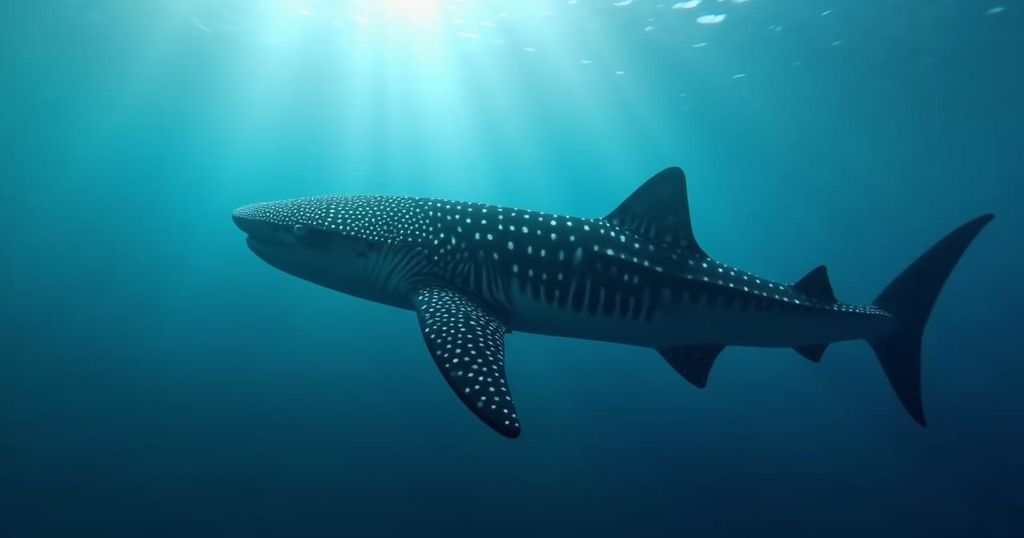A recent study in “Nature Climate Change” indicates that warming oceans may significantly increase the chances of collisions between whale sharks and large vessels. Researchers predict that by 2100, the likelihood of whale sharks encountering shipping traffic could rise by 15,000 times due to habitat shifts driven by climate change. This research underscores the urgent need for proactive measures to mitigate climate change and protect endangered marine species.
Recent research indicates that the warming of the oceans may exacerbate the risk of collisions between whale sharks and large vessels. A study published in “Nature Climate Change” outlines how increasing ocean temperatures can drive whale sharks, which are already endangered, into new habitats that intersect with major shipping lanes. Researchers from the University of Southampton and the Marine Biological Association predict that by the end of the century, the likelihood of whale sharks encountering ships could increase a staggering 15,000 times compared to current levels. Dr. Freya Womersley, the lead author of the study, stated, “These shifts in the whale sharks’ habitat were most extreme under high emission scenarios. A global reshuffling could lead to core habitat losses in some areas as well as increased co-occurrence with shipping traffic as oceans warm and other variables change.” As the world’s largest fish, whale sharks are highly mobile but particularly susceptible to ship strikes, which can lead to severe injury or death. The research team utilized satellite-tracking data of whale sharks and integrated it with global climate models, producing projections of their movement under various climate scenarios, including one based on continued heavy reliance on fossil fuels and another aligned with sustainable development objectives. The findings suggest that under high emissions scenarios, more than 50% of critical habitats may be lost in certain national waters by the year 2100, particularly in Asia. Conversely, under scenarios seeking to limit global warming to 2°C, some regions in Europe may actually experience a gain in suitable habitats. Professor David Sims, a co-author of the study, indicated, “The shifts we predict are likely to be less extreme if we are able to slow warming and mitigate climate change, suggesting that even complex, multi-factor impacts of climate change can be somewhat alleviated by our actions.” The research revealed that new habitats for whale sharks may increasingly overlap with areas of dense shipping traffic. Notably, regions in the North Pacific Ocean, the Eastern China Seas, and the North Atlantic Ocean were identified as particularly concerning. In contrast, some areas, such as parts of the Gulf of Mexico, showed a decrease in the overlap of whale shark habitats with shipping routes as they shifted closer to the coast. Significantly, the research found that ship co-occurrence with whale sharks is projected to increase under all future climate scenarios, even if shipping rates do not undergo the expected rise of up to 1,200% by 2050. Dr. Womersley emphasized the broader implications of their findings, stating that climate change could indirectly affect highly mobile marine species amid the interplay of human activities and environmental changes. This study underscores the necessity of incorporating climate change considerations into the management strategies for endangered species.
The impact of climate change on marine ecosystems is increasingly concerning, particularly for endangered species such as whale sharks. These creatures are highly mobile and sensitive to temperature variations, often adapting their habitats in response to changing environmental conditions. As the climate warms, shifts in habitat availability can lead to increased encounters with human activities, particularly shipping, posing greater risks of collisions that may threaten their survival. The study seeks to analyze these interactions through advanced climate modeling and habitat mapping, highlighting the urgency of addressing climate change’s multifaceted impacts on wildlife conservation.
The research emphasizes the critical intersection between climate change and the conservation of endangered species such as whale sharks. With predicted increases in the co-occurrence of these magnificent creatures and shipping traffic, immediate and sustained action to mitigate climate change is essential to protect whale sharks and their habitats. Fostering awareness and incorporating climate considerations into species management strategies will be vital for their survival.
Original Source: phys.org







